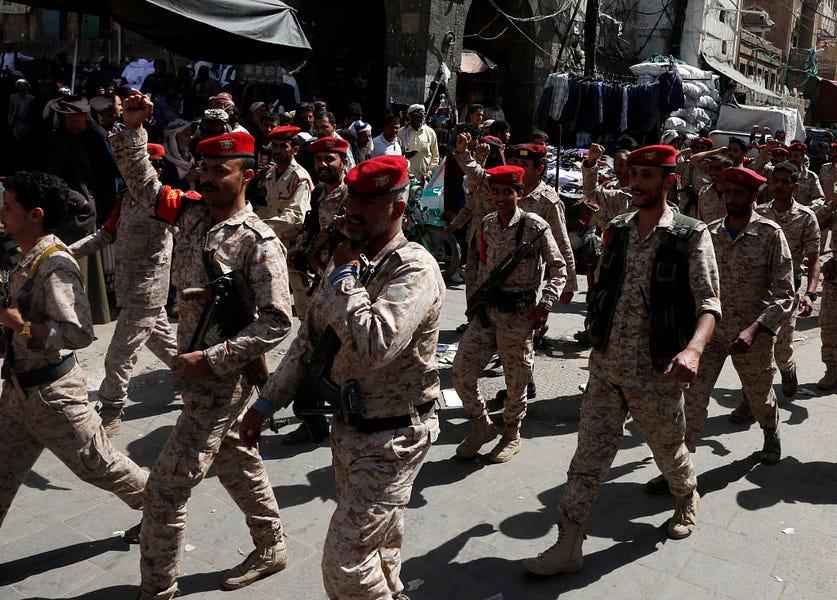The international community is elated at the April 2 announcement of a U.N.-brokered two-month long ceasefire in Yemen between the Saudi Arabia- and United Arab Emirates-led coalition, which backs the officially recognized Yemeni government, and the Iranian-supported Houthi movement. A statement from U.N. Secretary General Antonio Guterres is emblematic of this attitude, saying, “Today must be the start of a better future for the people of Yemen,” and that he intended to “support the successful implementation of the truce.” Metered, but passionately optimistic.
This optimism is unearned. The ceasefire likely gives Iran an achievement. What gives theocrats in Tehran an advantage is unlikely to lead to a meaningful peace.
Clearly, the Iranian Foreign Ministry views this as a gain. Saeed Khatibzadeh, the ministry’s spokesperson, lauded the ceasefire and “expressed hope that the move could be a prelude to a complete lifting of a blockade and a permanent establishment of a ceasefire in order to find a political solution to the Yemen crisis,” according to various news reports.
The hope that Iran is sincere in pursuing peace is understandable. The humanitarian costs in Yemen are catastrophic. The conflict had killed 377,000 people by the end of 2021, according to U,N. estimates, and nearly half the country lacks sufficient food, according to the United Nations World Food Program. Moreover, the current situation is a security nightmare. Yemen is a hotbed for terrorist groups. According to the 2020 State Department Country Reports on Terrorism for Yemen, “AQAP, ISIS-Yemen, and Iran-backed terrorist groups such as Hizballah and the IRGC-QF continued to exploit the political and security vacuum created by the ongoing conflict.” This situation has not improved.
The war in Yemen is incredibly complex, includes multiple inside and outside actors, and has a long history. Indeed, even stating when the current war started is difficult. It is often grouped in with the various uprisings that occurred during the Arab Spring in 2011, and that is when the fighting indeed intensified. But conflict with what is now known as the Houthi movement, mostly made up of Zaydi Muslims, a Shiite sect, first occurred in 2004. Moreover, Yemen wasn’t even a unified country until 1990, after the fall of the Soviet Union. It was then that the formerly communist South Yemen and the more traditional North Yemen were unified by former President Ali Abdullah Saleh, and that was followed by a period of civil war. To complicate matters further, a Zaydi dynasty ruled portions of Yemen for centuries prior to being deposed in 1962.
But hope alone does not make for good policy. While the Iranian regime and the Houthis don’t always see eye-to-eye, and Iran may, at times, struggle to control them, it is well-established that the Houthis are a regime proxy. Indeed, the Houthi slogan is “Death to America, death to Israel, damnation to the Jews,” a variation of the slogan used by the Iranian mullahs in the 1979 revolution. As former State Department spokeswoman Marie Harf told reporters years ago, “There is a well-documented history of (Iranian) support for the Houthi(s).” This support has not abated.
Yet there has been a strange habit on the part of much of the Western media and a chunk of Western politicians to portray the entire war as being a Saudi-led aggression into the internal affairs of another country—ignoring Iran’s role—and to call for the end of the war, essentially, by coercing the Saudi-UAE-Yemeni government coalition to concede. This is in spite of the fact that it was unquestionably the Houthi rebellion, with a temporary alliance of convenience with the (now deceased) former President Saleh, that forced the internationally recognized government of President Abed Mansour Hadi into exile.
President Biden campaigned on ending U.S. support for the Saudi’s efforts, and delisted the Houthis as a terrorist organization, reversing a last-minute Trump administration decision. However, the Biden administration has not entirely followed through with this promise, perhaps realizing that a complete takeover of Yemen by the Houthis would be disastrous.
The sentiment driving these actions is perhaps best explained by Kate Kizer, the former lead policy advocate at the Yemen Peace Project, who recently wrote that both Republicans and Democrats want to find a “face-saving way to exit [while] ignoring the obvious answer of no—Saudi Arabia started a war everyone knew was a mistake,” and that, in her view, “the U.S. government has instead engaged in the business of helping to starve millions of people to assuage crown prince Mohammed bin Salman.” Iran’s role is barely mentioned, while the fact that the Houthis would have overthrown an internationally recognized government gets ignored entirely. It is no coincidence that Kizer is now a writer for the Quincy Institute, dubbed Washington’s “weirdest” think tank, founded by the former president of the National Iranian-American Council, widely known as an Iranian regime mouthpiece.
However, Kizer is correct that the prevailing sentiment in Washington tends to view the entire conflict through the lens of Saudi involvement, and to view Western support as a mistake. The Senate passed a resolution in 2019 framing the entire war through the lens of Saudi’s role and seeking an end to any U.S. support for the coalition.
One need not be uncritical of the Saudi monarchy, or apologize for the frequently criticized methods by which the Saudi military has executed the war, to realize this is a mistake.
Indeed, the ceasefire comes only after several recent attacks by Houthi forces against Saudi Arabia and UAE, not on the battlefield in Yemen, but in their homelands. UAE is heavily reliant on the fact that it has been an “island of stability” in an otherwise unstable region, a perception these attacks were likely intended to damage.
Worse, these attacks came after “significant gains” were made recently “by the government on the Yemeni battlefield,” by UAE and Saudi related forces. In other words, “Incensed by recent government gains, the Iranians seek to intimidate the UAE into reversing course,” according to widely respected Israeli commentator Jonathan Spyer. Indeed, even Kizner agrees that these strikes are “a warning from the Houthis that they will target the UAE directly in response” to anti-Houthi coalition gains.
The backdrop to this entire affair is the Biden Administration’s increasingly reckless drive for a new Russia-negotiated Iran deal, almost certainly weaker than the failed agreement that came before it. Saudi and UAE reluctance to produce more oil in response to the war in Ukraine, and UAE’s controversial decision to meet with Bashar al-Assad, the genocidal dictator of Syria, as well as their willingness to acquiesce to this ceasefire, can, in large part, be seen as outgrowths of the instability that results from the perceived withdrawal of American support.
The Biden administration’s ineptitude in responding to the Houthis destabilizing moves is also partly a consequence of its drive to appease Iran. Biden didn’t call Prince Mohamed bin Zayed, the de-facto ruler of UAE, for three weeks after the initial attack. Indeed, Prince Zayed was obviously incensed, refusing to meet with Gen. Kenneth F. McKenzie Jr., then the head of the United States’ Central Command, since he only came to visit more than three weeks after the attack.
As David Adesnik of the Foundation for the Defense of Democracies recently wrote for The Dispatch, “Pursuit of a deal has led the Biden administration to make concessions that damage Emirati interests … the Houthis responded by intensifying their war against Yemen’s internationally recognized government, whose principal supporters include the UAE.”
During Secretary of State Anthony Blinken’s recent trip to the region, he went to lengths to patch up the relationship, taking a special trip to Morocco to visit Prince Zayed, who was on vacation. While this did result in some minor steps aimed at assuaging Emirati concerns, these steps are clearly aimed at damage control more than a positive, collaborative relationship.
There is no easy way out. Yemenis are a proud people who have fought off foreign intervention from numerous nations for centuries, and Saudi and UAE intervention is viewed skeptically, even by many Yemenis not siding with the Houthis. At the same time, the coalition has kept Iran from consolidating power. As Spyer points out, a total Houthi victory in Yemen would “allow Tehran to choke off maritime traffic between the Gulf of Aden, the Red Sea, and the Suez Canal.” This would further destabilize the region and lead to more conflict.
Upon the announcement of the ceasefire, Biden said that it “must be adhered to … it is imperative that we end this war.” If that language sounds familiar, it’s because it’s similar to the language Biden used in the run-up to the debacle in Afghanistan. The situation in Yemen is very different, but the more people think about ending the war, rather than dealing with Iranian aggression, peace is not likely to follow.






Please note that we at The Dispatch hold ourselves, our work, and our commenters to a higher standard than other places on the internet. We welcome comments that foster genuine debate or discussion—including comments critical of us or our work—but responses that include ad hominem attacks on fellow Dispatch members or are intended to stoke fear and anger may be moderated.
With your membership, you only have the ability to comment on The Morning Dispatch articles. Consider upgrading to join the conversation everywhere.